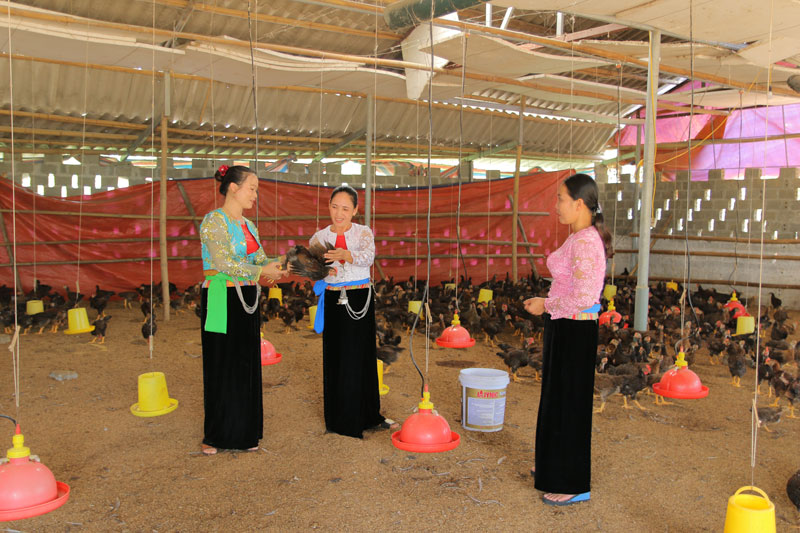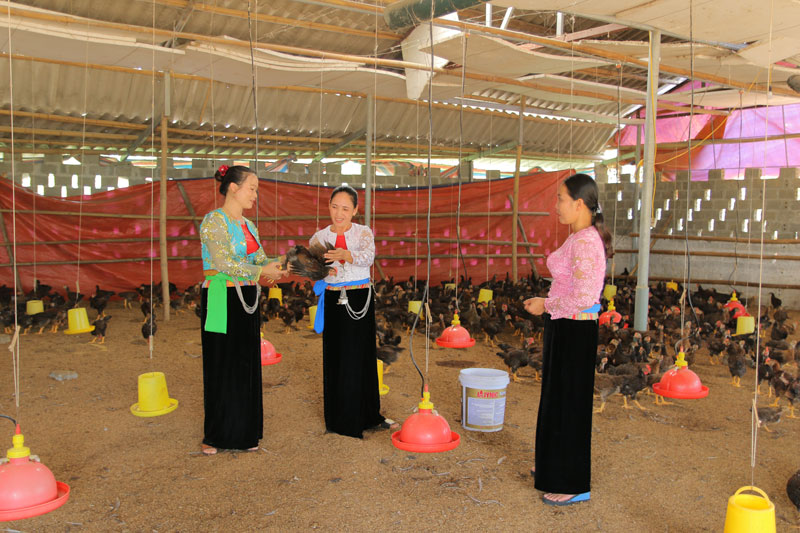
(HBO) – Last year, hill chicken farmed by Huong Nhuong Cooperative was among Lac Son district’s three products recognised in the One Commune One Product (OCOP) programme. The cooperative’s fresh whole chicken product was awarded three-star OCOP by Hoa Binh province.
The
cooperative aims to promote clean and safe production chain and develop the
Huong Nhuong hill chicken brand.
 Members
of Huong Nhuong Hill Chicken Cooperative (Lac Son) share experience in chicken
farming.
Members
of Huong Nhuong Hill Chicken Cooperative (Lac Son) share experience in chicken
farming.
Huong Nhuong
hill chicken is an indigenous chicken raised by Muong ethnic minority people in Huong Nhuong
commune, Lac Son. People in Huong Nhuong, including those from Bung village,
used to raise chicken on a small scale with little
use of farming techniques so they are often squeezed by traders. Moreover, poor
techniques and weak feed and
variety control caused
frequent diseases in chicken. To deal with such challenges, 12 farmer
households in the village have gathered to form a farming group in which they
can share experience.
In August
2018, the farmers’ group took part in a sustainable poverty reduction
initiative contest in Hanoi and won the third prize. This has motivated them to expand chicken production
and develop as a cooperative.
Since the
cooperative was founded, the member households have attended many technical
training courses on chicken
farming held by the province and district. Seven farmer households started with
about 7,000 chickens in total, the largest flock included 3,000 – 4,000
chickens each litter while the smallest was around 200 – 500 each litter. Some
other members raise buffalos and grow safe vegetables and citrus trees.
In 2017, the
cooperative was selected to join a chicken value chain production project under
the new-style rural area building programme. The project provided the cooperative with 8,000 baby chickens, technical training courses and
chicken medicines, as well as supported member households in building slaughtering houses and developing preservation system at the cost of 300
million VND.
Director of
the cooperative Quach Thi Hoa said the cooperative mostly raises indigenous Ri chicken. Since the
cooperative was founded, its members have had a chance to not only share
experience but also buy high-quality
chicken breeds and feed at lower prices as middlemen were cut out, she said.
She added that
the cooperative has created a linkage between farmer households and helped them
distribute their products. It is actively developing the chicken brand to add
more values to the product, thusbenefiting local farmers./.
According to data from the Hoa Binh Provincial Party Committee, the industrial production index for the first six months of 2025 is estimated to have increased by 20% compared to the same period last year. This marks the highest year-on-year growth rate for this period since 2020.
In the first six months of 2025, Hoa Binh province’s export turnover was estimated at 1.145 billion USD, marking an 18.11% increase compared to the same period in 2024. Import turnover was estimated at $ 804 million, a 17.15% increase, which helped the province maintain a positive trade balance.
The lives of the ethnic minority farmers in Tan Lac district have gradually improved thanks to the new directions in agricultural production. This is a testament to the collective strength fostered through the professional associations and groups implemented by various levels of the district’s Farmers’ Union.
With the motto the "product quality comes first,” after nearly one year of establishment and operation, Muong village’s Clean Food Agricultural and Commercial Cooperative, located in Cau Hamlet, Hung Son Commune (Kim Boi district), has launched reputable, high-quality agricultural products to the market that are well-received by consumers. The products such as Muong village’s pork sausage, salt-cured chicken, and salt-cured pork hocks have gradually carved out a place in the market and they are on the path to obtaining the OCOP certification.
In the past, the phrase "bumper harvest, rock-bottom prices" was a familiar refrain for Vietnamese farmers engaged in fragmented, small-scale agriculture. But today, a new spirit is emerging across rural areas of Hoa Binh province - one of collaboration, organisation, and collective economic models that provide a stable foundation for production.
Maintaining growing area codes and packing facility codes in accordance with regulations is a mandatory requirement for agricultural products to be eligible for export. Recently, the Department of Agriculture and Environment of Hoa Binh province has intensified technical supervision of designated farming areas and packing facilities to safeguard the "green passport" that enables its products to access international markets.



 Members
of Huong Nhuong Hill Chicken Cooperative (Lac Son) share experience in chicken
farming.
Members
of Huong Nhuong Hill Chicken Cooperative (Lac Son) share experience in chicken
farming.